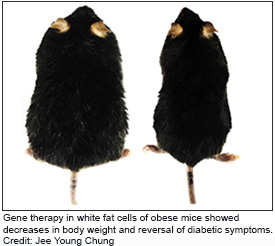To overcome the side effects of current anti-obesity drugs, researchers Jee Young Chung and colleagues developed a specific gene silencing therapy against a fatty acid metabolism gene, Fabp4. Researchers used a CRISPR interference system wherein catalytically dead Cas9 protein and single guide RNA was targeted to white adipocytes with a tissue-specific fusion peptide. The complex is internalized with little toxicity to the cells and, upon internalization, decreased the expression of Fabp4 and reduced lipid storage in adipocytes. Demonstrating that this delivery method performed well in cells, Chung and colleagues tested their therapy on obese mice. Mice were fed a diet high in fat leading to obesity and insulin resistance. Fabp4 repression resulted in a 20% reduction of body weight and improved insulin resistance and inflammation after just six weeks of treatment. Additional systemic improvements were observed, including a reduction in fatty lipid deposition in the liver and reduced circulating triglycerides.
The current standard FDA-approved treatment showed just 5% of body weight loss after one year of treatment in humans. However, while this therapy displays promising results in mice, further studies are required before it can be used in clinical treatment against human obesity. Importantly, this work highlights the advances in precision gene editing technology, which can be translated to other types of therapies.
The authors, Chung et al., are available for more information by contacting Hyun Woong Jeon at Hanyang University ([email protected]); +82-2-2220-2033 [office]). Interested reporters may obtain copies of the manuscript via email from Dana Macciola, Administrative Assistant, Genome Research ([email protected]); +1-516-422-4012).
The manuscript will be published online ahead of print on Aug 29, 2019. The full citation is as follows:
Jee Young Chung, Qurrat Ul Ain, Yoonsung Song, Seok-Beom Yong, and Yong-Hee Kim. 2019. Targeted delivery of CRISPR interference system against Fabp4 to white adipocyte ameliorates obesity, inflammation, hepatic steatosis, and insulin resistance Genome Res doi: 10.1101/gr.246900.118
Launched in 1995, Genome Research (www.genome.org) is an international, continuously published, peer-reviewed journal that focuses on research that provides novel insights into the genome biology of all organisms, including advances in genomic medicine. Among the topics considered by the journal are genome structure and function, comparative genomics, molecular evolution, genome-scale quantitative and population genetics, proteomics, epigenomics, and systems biology. The journal also features exciting gene discoveries and reports of cutting-edge computational biology and high-throughput methodologies.
Cold Spring Harbor Laboratory Press is an internationally renowned publisher of books, journals, and electronic media, located on Long Island, New York. Since 1933, it has furthered the advance and spread of scientific knowledge in all areas of genetics and molecular biology, including cancer biology, plant science, bioinformatics, and neurobiology. The Press is a division of Cold Spring Harbor Laboratory, an innovator in life science research and the education of scientists, students, and the public. For more information, visit our website at http://cshlpress.org.
Genome Research issues press releases to highlight significant research studies that are published in the journal.
 Cold Spring Harbor Laboratory Press Bookstore
Cold Spring Harbor Laboratory Press Bookstore

